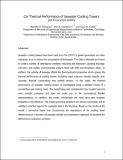On thermal performance of seawater cooling towers
Author(s)
Sharqawy, Mostafa H.; Lienhard, John H.; Zubair, Syed M.
DownloadOn thermal performance of seawater cooling towers_GTP_2010.pdf (191.7Kb)
OPEN_ACCESS_POLICY
Open Access Policy
Creative Commons Attribution-Noncommercial-Share Alike
Terms of use
Metadata
Show full item recordAbstract
Seawater cooling towers have been used since the 1970s in power generation and other industries, so as to reduce the consumption of freshwater. The salts in seawater are known to create a number of operational problems, including salt deposition, packing blockage, corrosion, and certain environmental impacts from salt drift and blowdown return. In addition, the salinity of seawater affects the thermophysical properties that govern the thermal performance of cooling towers, including vapor pressure, density, specific heat, viscosity, thermal conductivity, and surface tension. In this paper, the thermal performance of seawater cooling towers is investigated using a detailed model of a counterflow wet cooling tower. The model takes into consideration the coupled heat and mass transfer processes and does not make any of the conventional Merkel approximations. In addition, the model incorporates the most up-to-date seawater properties in the literature. The model governing equations are solved numerically, and its validity is checked against the available data in the literature. Based on the results of the model, a correction factor that characterizes the degradation of the cooling tower effectiveness as a function of seawater salinity and temperature approach is presented for performance evaluation purposes.
Date issued
2011-04Department
Massachusetts Institute of Technology. Department of Mechanical EngineeringJournal
Journal of Engineering for Gas Turbines and Power
Publisher
American Society of Mechanical Engineers
Citation
Sharqawy, Mostafa H., John H. Lienhard, and Syed M. Zubair. “On Thermal Performance of Seawater Cooling Towers.” Journal of Engineering for Gas Turbines and Power 133.4 (2011): 043001.
Version: Author's final manuscript
ISSN
0742-4795
1528-8919